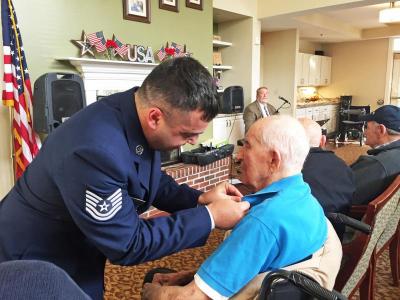Dartmouth man remembers World War II
Dartmouth resident Ed Mello saw the world’s first fighter jet in action during his service in the U.S. Army Air Force at the end of World War II.
The veteran was one of 20 honored at a Veterans Day ceremony at the Cottages at Dartmouth Village, an assisted living facility where the New Bedford native currently lives.
He flew 20 missions from a base in Northeastern England during the war, acting as flight engineer on B-24 bombers — a heavy aircraft also known as the Liberator.
On a few of his missions, Mello saw the first fighter jet aircraft, the German Messerschmitt Me 262.
“That scared me a little bit,” he said of the advanced aircraft. “They were fast.”
“They usually came in from the East,” Mello continued. “They started firing when they were about 1,000 feet away. When they come bursting through a formation, usually they get one or two planes.”
He smiled. “We were lucky, we never got hit at all.”
Mello flew on B-24 bombers, also known as Liberators, that could carry up to 8,000 pounds of explosives.
He remembered one evening in particular, when he was flying in formation with 27 aircraft.
“We’re flying along in perfect formation — they’re beautiful planes, it would have made a nice picture — all of a sudden this group came right through our spotter.”
The enemy fighters attacked the first row of the formation, Mello said.
“...And all of a sudden, you didn’t see any airplanes at all. We went into a spin, and I was hanging on. The pilot was fighting the spin. And he pulled out at about 7,000 feet.
“I didn’t think anything about bailing out, because you’re gonna land in the water, and...you’re gonna die from freezing to death. But we got back and everything was all right after that.”
In his job as flight engineer he acted as top turret gunner and was also responsible for making repairs on the fly.
“I always carried a little bag of tools,” he noted.
Even repairing the aircraft could be dangerous.
Once, Mello said, he had to change the unit that controls the supercharger.
“I had to take off my oxygen mask, because the tube couldn’t go that far,” he explained. “And I had to undo my heating suit. So I got down and I had to work fast.”
He said if it took him longer than five minutes, he’d run out of oxygen. Luckily the job went smoothly.
“And a couple of times I had to go out to the bomb bay,” he said. “One of the switches that releases the bombs freezes up if there’s the least little dampness in the air...So I had a screwdriver, and [my buddy] kicked the bomb out.”
But Mello said that the time he spent in the European theater could have been much worse.
“This was the last moments of the war, and it wasn’t that bad at all,” he noted.
When the war was over, he came back home.
“I was discharged on December 7. I came home, first thing I did was sign up to finish high school. I did very well, for a change,” he joked.
When asked if he had a favorite memory from his time in the war, however, Mello didn’t mince words.
“Yeah,” he said. “Getting out.”














